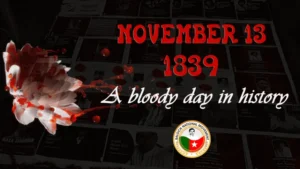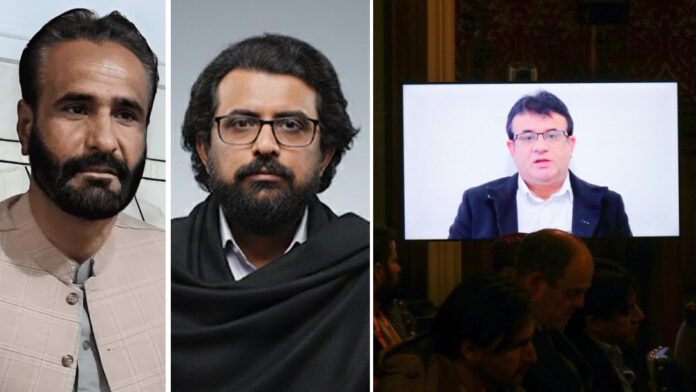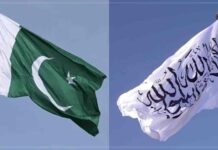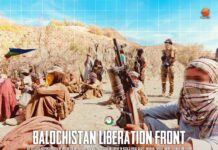Quetta (NVI) : The Baloch National Movement (BNM) organized commemorative ceremonies to mark ‘Baloch Martyrs’ Day’, which refers to November 13, 1839 when British troops killed top Baloch leader or ‘Khan-e-Baloch’ Mehrab Khan along with numerous other fighters in fighting after which the United Kingdom occupied the region.
Speaking on the occasion, BNM Chairman Dr. Naseem Baloch said that political parties and institutions are the backbone of national liberation movements.
After Pakistan’s occupation, the Baloch resisted repeatedly, but in the absence of strong institutions, the movements could not sustain, he said.

Addressing different programmes, he said institutions are crucial for continuity.
He recalled that the most intense phase of resistance occurred in the 1970s, but the struggle lasted only four years because it lacked an organized structure.
By contrast, the present resistance movement has continued for 25 years and is steadily strengthening precisely because of the foundational role of political organizations.
“If we did not have organized institutions today, our movement would not have reached this strong stage, and the voice of the Baloch would not have echoed on the international stage. The world values our struggle because we have effective organizations and political parties,” he added.
Referring to the Baloch diaspora, he said this is the first time in history that due to war, large numbers of Baloch have dispersed to countries across the world.
Earlier, most Baloch migrated to Afghanistan, but now they are present in far-flung corners of the world — and these are not ordinary migrants, but committed figures associated with the national movement.
The Chairman said that Baloch living in Europe and the United States use every opportunity to reach institutions and raise the Baloch question.
“The current diaspora is far more organized and effective than the migrants of the 1970s. During the last 15 years, BNM has organized the diaspora into a strong political front. Today, the Baloch diaspora is the vanguard of international campaigns exposing human rights violations in Balochistan.”
He added that the strength of the movement today is the result of the tireless work of Baloch political organizations. The political cadres of BNM, BSO-Azad, and BRP have played a decisive role in nurturing Baloch national consciousness.
Dr. Naseem Baloch said that the purpose of Martyrs’ Day is not only to remember martyrs, but to renew the commitment to continue their mission.
“The martyrs fulfilled their responsibility. Now the rest of the journey lies on the shoulders of the living. We are the ideological heirs of the martyrs, and when we joined the party, we swore to carry forward their mission. We must strengthen our institutions and take the movement forward.”
He emphasized that politics is central to the success of national struggles. “Education, human rights advocacy, and armed resistance — these are all different forms of political struggle. If the gun is separated from politics, success becomes impossible. The Tamil movement was powerful, but after the political front weakened and the struggle relied exclusively on armed resistance, it suffered defeat. We must not repeat past mistakes. If I make mistakes, my comrades have full right to criticize and hold me accountable.”
Explaining further, he said the enemy also gains experience over time. “The state has far greater resources and will use every tactic to crush us. We must understand the enemy’s strength and move forward with intelligence and wisdom. Our policies should inflict cost on the enemy without allowing it to anticipate our strategy.”
In addition to Dr. Naseem Baloch, the ceremony was addressed by BNM Secretary of Information and Culture Qazi Dad Muhammad Rehan, Central Committee member Chief Aslam Baloch, Zone President Ustad Mehran, Vice President Talar Naz, and Finance Secretary Meerak Baloch.
Speaking at the event, Qazi Dad Mohammad Rehan said that the Baloch must respect and strengthen their organizations and understand the importance of BNM in Baloch politics. “BNM is the first party that clearly demanded the freedom of Balochistan. Understanding the importance of BNM clarifies why the martyrs sacrificed their lives.”
He said BSO and Baloch students have always played a historic role in the movement. “Student politics is temporary, after which individuals join different organizations. But those who join BNM often remain associated for life — this is an attachment that passes from generation to generation.”
Qazi Rehan said November 13 reminds the nation not only of freedom, but of what has been lost along the way. “Nations around the world preserve their historical heritage, while we have been deprived of ours. Every occupier attempted to erase the history and identity of the oppressed. From Alexander the Macedonian to Arab rulers, all targeted our land’s history and linguistic heritage.”
He recalled that when the British besieged Kalat, the Khan of Kalat sought support from the tribal sardars and sent his daughter as a messenger, but the sardars allied with the British. In contrast, the Hindu Baloch stood for the motherland and recorded a chapter of history that will always be remembered.
“They said: If our faith is a barrier, we are ready to renounce it — but we will not retreat from defending our homeland. They were immortalized in that struggle.”
Other speakers said that nations that remember their martyrs remain victorious, while those who forget their sacrifices are doomed. The martyrs knew the enemy was powerful, yet chose resistance over submission. “If the Baloch today are recognized across the world, it is because of the blood of martyrs.”
They added that Mir Mehrab Khan, fully aware that he faced a far superior enemy, chose the path of martyrdom and set an example for generations. “November 13 is a remembrance of that struggle, and today we salute all our martyrs.”
Speakers said that the foundation laid by Mir Mehrab Khan remains alive today, and the Baloch continue to sacrifice their lives for national freedom, identity and dignity. “Not a single day passes in Balochistan without the martyrdom of a struggler.”
They recalled that when the British marched toward Afghanistan, they feared the Baloch might block their passage. As they traveled through Bolan, the Marri Baloch attacked them and forced them to retreat. (NVI)








